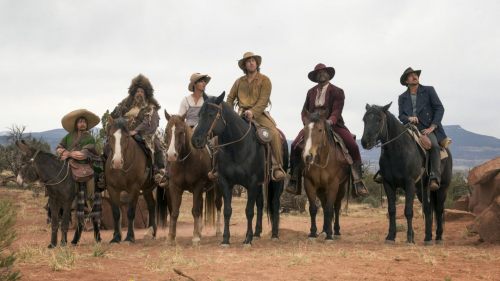ABROAD UNDERSTANDING: A Netflix Special Shot In Two Countries
Stand-up comedy is one of the most discussed forms of entertainment in the streaming era, but it’s seldom given the same critical eye as its more narrative-based contemporaries. That's not necessarily surprising since nobody watches stand-up for its filmmaking form, but that form also has the ability to make or break a good special. Go in too tight or stay too wide and you could mess up the emphasis. Hold too long on a joke that doesn't land and you might expose it. Cut away too soon and you might lessen its impact. But what if the point of a special lies in the editing itself? What if cutting around jokes, or to and from them, is exactly the point of the routine?
Abroad Understanding is designed to be niche. That is, if you consider all the Indian, Pakistani, Bangladeshi, Nepali and Sri Lankan people in the world a niche audience, but in the world of ostensibly "mainstream" entertainment, the default often skews heavily Western and white. Where Vir Das is a household name in India, a Bollywood star able to sell out entire stadiums on his home turf of New Delhi, he's an obscure oddity in New York City, performing for comedy clubs of around 200 where only the Desis in the audience have heard of him. So, how does he reconcile this difference and all the other differences that come with being an Indian who's spent time in the Western world? He shoots his special at both these venues, cutting between the two as a means of both physical and cultural contrast. Vir Das’ latest entry goes beyond the realm of a single space, collapsing time as jokes are set up in front of one audience and hit their punch-line in front of another. It doesn’t matter which half of the special was filmed first. Like Das’ cultural mindset, they exist in tandem.
The content suits this format admirably, stemming from Das’ personal experiences as an Indian who grew up everywhere from Nigeria to New Delhi to Illinois to Moscow, or as he calls it, “a journey to lighter skin.” His big dreams exist in two different realities, selling out an Indian stadium and performing in an American comedy club, and Abroad Understanding feels like the concurrent apotheosis of these two journeys, but it’s also more complicated than that. Unlike most specials you’re sure to find on Netflix, Das doesn’t edit out the moments his jokes don’t land. He doesn’t’ cut around the awkward silence, nor the times he has to explain what he’s talking about, because it’s part and parcel of his thesis statement.
Other than the specifics of addressing each crowd – the enthusiastic, amorphous Delhi denizens, and the well-lit New Yorkers spread out enough to become targets of individual banter – the routine remains largely unchanged. Jokes with specific cultural references to Parliamentary tardiness or Two-Minute Maggi Noodles kill in front of the Indian crowd, but land with a thud to every non-Indian at the two-drink minimum venue. The jokes about American socio-politics and racial experience in the Trump era make sense to the New Yorkers who’ve lived it, but the laughs feel somewhat distant to the Indian audience, for whom American experience is filtered through the lens of film and television. The content oscillates between these two parts of Das’ lived experience, a collective whole that informs his outlook, but parts of him that are only understood by people half the time, depending on where he is.
Clocks from various time zones adorn both settings, forcing a constant awareness of the format. While he’s at home on the Delhi stage, elevated above the crowd as they hang onto his every word, he’s more-or-less level with the New York audience, who take their time warming to his accent. He speaks of experiences that are uniquely Indian, uniquely American, and things that are a cross between the two, harping on communication across cultures as an active effort that could make the world a better place… while also throwing in the odd crass joke about jerking off to well-filmed American ads about French fries. He crosses that line with almost non-jokes about sex and gender stereotypes, eliciting derisive “ooh”s from the smaller crowd who’ve heard it all before, but the dumbed-down sexual content works for the stadium full of people for whom sex is still a taboo subject. He’s seen as progressive in one realm, but perhaps not so much in the other. An odd an honest dichotomy.
The duality of the special’s format ends up a physical manifestation of Das himself, and of those of us who exist between Eastern and Western cultures, unable to fully reconcile the two while seeking acceptance from both. While there’s no literal narrative through-line to the routine, something Das even comments on in an especially audacious moment of anti-humorous segue, the meta-narrative becomes about pulling these distinct halves together and getting everyone on board by the end, as he cites “difference” itself as our biggest similarity. Well, that and how much we hate the "typing..." message on social media.
The jokes are allowed to breathe in each setting, mind you. The only time there’s rapid cross-cutting is when there’s a point to be made, but there are just as many poignant beats where stillness is key. A comedic anecdote about an accident caused by an idiotic young Indian couple, who beg Das not to bring the incident up with their conservative parents, veers suddenly into commentary about continued religious disparity amidst a moment of realization. On the American side, he brings both white and black audiences into his world, telling them what their interactions in India would be like, and the complex racial reasons as to why.
Das connects the dots across his two cultures, his Indian schooling and his life in an American college, switching out the specifics to show us just how much the dynamics remain unchanged, for better or for worse. It’s the kind of comedy that feels timely for both nations, as they each become more actively authoritarian under “orange” leadership (Donald Trump and right-wing Hindu extremism) as they each try and find new ways to adapt to this rapidly regressing paradigm. But Das is not one for a safety net. His seemingly frivolous routines about religion and terrorism are distinctly opinionated, making segments of Abroad Understanding the kind of risky challenge that lies somewhere between laughs and discomfort, and his comedy is peppered with a handful of soapbox moments that might not be everyone’s cup of chai. Ultimately though, it’s a passionate piece that encompasses his dual outsider worldview on issues that affect us all.
It’s an opportunity to learn on several fronts, be it the best and worst of both nations, or even having to Google specific references to see what jokes we might be missing out on as people halfway across the world find them uproarious. More than anything, it’s a hilarious experiment that lies right on the nexus of disparate cultures, a nexus where more and more people continue to find themselves in the age of globalism. It’s active, self-aware comedy that isn’t afraid to get stupid, and it certainly isn’t afraid to challenge notions of what we believe about each other, or even about ourselves.
Abroad Understanding is now streaming on Netflix worldwide.



